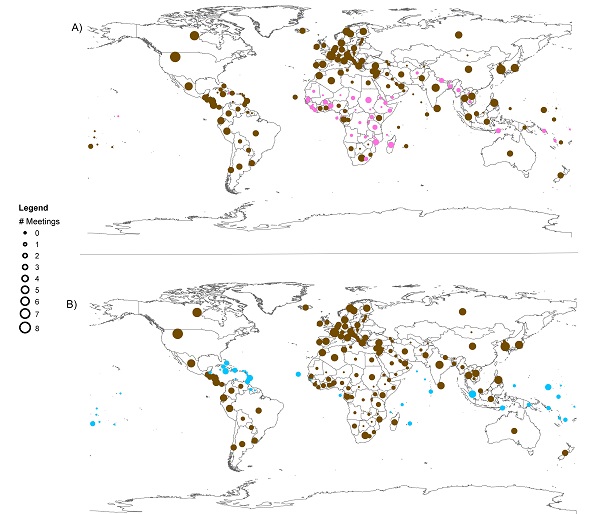Ensuring equity in conservation and sustainable use of ocean biodiversity Study finds imbalances in negotiating a new international agreement


Imbalanced participation in meetings on marine biodiversity in areas beyond national jurisdiction
Size of dots corresponds to the number of recent meetings on BBNJ attended by government representatives, ranging from 0 (smallest dots) to 8 (largest dots). Least developed countries are pink, small island developing states are light blue, and all other countries are brown.
Credit: CC-BY Blasiak et al. 2016.
A team led by researchers at the University of Tokyo has quantified substantial imbalances in the ongoing international negotiations on the conservation and sustainable use of marine biodiversity in areas beyond national jurisdiction (BBNJ). These findings provide a firm basis for designing measures to ensure that all countries have the capacity to contribute to the process, and that the negotiations result in an equitable outcome.
In 2015, the United Nations General Assembly passed Resolution 69/292 to establish a negotiation process for creating a new legal agreement on the conservation and sustainable use of BBNJ. The agreement would cover about 40 percent of the Earth’s surface, comprising remote parts of the ocean beyond state boundaries, which are home to species and entire ecosystems that remain mysterious and about which little is known. Yet human activities are increasingly impacting these areas even as people are becoming more aware of the ocean’s vast contributions toward human nutrition and atmospheric regulation, as well as being a treasure trove of genetic resources that may hold the key to future medical and technological innovations. But although every member country has a seat in the ongoing negotiations at the UN Headquarters in New York, little is known about the capacity of each country to assert and represent their interests with regard to the management of BBNJ.
The research team led by Research Fellow Robert Blasiak at the Graduate School of Agricultural and Life Sciences, the University of Tokyo, and collaborators found significant imbalances in the capacity of countries to participate in these negotiations. For one, the researchers showed that least developed countries (LDCs) and small island developing states (SIDS), as defined by the UN, are underrepresented compared with highly industrialized countries like members of the Organization for Economic Cooperation and Development (OECD) (see figure). Moreover, they found many of the issues being negotiated are highly technical, and the scientific literature overwhelmingly being produced by a handful of countries—with just five producing over 70 percent of such publications—thus pointing to diverse levels of scientific and technical capacity among different country delegations. Analyzing the statements of delegations during the first BBNJ negotiations revealed substantial differences in the issues of primary interest among groups of states.
The current research, by quantifying imbalances in ongoing international negotiations, aims to serve as an impetus for implementing measures to provide scientific and technical support to all delegations, and help sustain their participation in the negotiations. Such steps would help to ensure a more equitable outcome and a better chance of compliance with any new international agreement.
“The oceans provide benefits that touch the lives of every person around the world,” says Blasiak. He continues, “Now it is up to the international community to work together to ensure that these benefits are shared by all, and continue to be available to future generations.”
Paper
, "Negotiating the Use of Biodiversity in Marine Areas beyond National Jurisdiction", Frontiers in Marine Science Online Edition: 2016/11/11 (Japan time), doi: 10.3389/fmars.2016.00224.
Article link (Publication)
Links
Graduate School of Agricultural and Life Sciences
Department of Global Agricultural Sciences, Graduate School of Agricultural and Life Sciences
NEOPS project (New Ocean Paradigm on its Biogeochemistry, Ecosystem and Sustainable Use)
Efforts to conserve and manage the high seas show serious disparities among ‘equal’ countries






